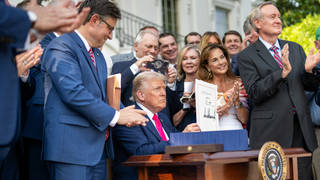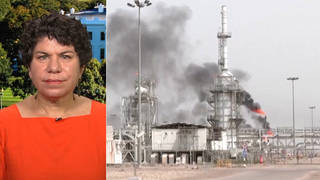
Topics
Guests
- Marianne LavelleStaff writer at the Center for Public Integrity.
- Chris FieldFounding director of the Carnegie Institution’s Department of Global Ecology and a professor of biology and environmental earth System science at Stanford University. He is also co-chair of Working Group 2 of the Nobel Prize-winning Intergovernmental Panel on Climate Change.
A new report from the Center for Public Integrity reveals that the number of global warming lobbyists has increased by more than 300 percent in the past five years. In the past year, some 770 companies hired over 2,000 climate change lobbyists and spent an estimated $90 million to influence federal policy on climate change. We speak to the report’s lead author, Marianne Lavelle. [includes rush transcript]
Transcript
JUAN GONZALEZ: A new report from the Center for Public Integrity reveals that the number of global warming lobbyists has increased by more than 300 percent in the past five years. The Center found that just in the past year some 770 companies hired over 2,000 climate change lobbyists and spent an estimated $90 million to influence federal policy on climate change.
Although the explosive growth of the climate change lobby has also seen an increase in those lobbying for alternative energy and environmental and health issues, they are far outnumbered by other interests by eight-to-one. Some of these other interests include the US Chamber of Commerce; the National Association of Manufacturers; large coal, oil and gas companies; Wall Street banks; and the American Coalition for Clean Coal Electricity. Their lobbyists include powerful former Congress members, White House staffers, and officials from previous administrations.
AMY GOODMAN: The report cites NASA scientist James Hansen’s warning that “special interests will dilute and torque government policies, causing the climate to pass tipping points, with grave consequences for all life on the planet.”
We’re joined now from Washington, D.C. by the lead writer of the report, Marianne Lavelle, staff writer at the Center for Public Integrity.
Welcome to Democracy Now! Just lay out for us your major findings, Marianne.
MARIANNE LAVELLE: Well, what we found was really while policy has been standing still on climate for the last few years, the special interests have not been standing still. They’ve been really redoubling their efforts, and, as Juan said, they’ve quadrupled in number the lobbyists over the last five years.
And we found not only have the energy companies and the manufacturers increased their efforts, but a whole range of new interests have joined in. For example, Wall Street and private equity firms, finance firms, insurance companies like AIG, they were not on the scene at all in 2003. Last year, they had as many lobbyists as alternative energy did, and they’re engaged, of course, in the whole idea of a carbon market. So, they have that interest.
We also see cities and counties and public agencies also are lobbying in great numbers, trying to get a piece of the revenue that might be brought in from a climate program. So it’s going to be a very complicated scene as lawmakers try to put together a policy, especially when you think of the urgency that Dr. Field was talking about on the science on this matter.
JUAN GONZALEZ: Marianne Lavelle, many of those cities and municipalities were hoping to get some transit, mass transit, dollars out of the cap-and-trade system that President Obama has backed. But now, today, in today’s New York Times, we learn that the President is already planning to spend the vast amount of that money in a tax reduction program for low-income Americans. Could you comment on that?
MARIANNE LAVELLE: Right, right. There are going to be a host of interests and, really, decisions to be made. The money will be brought in, under this plan, from the fossil fuel industry, but how do you divvy it up? For example, public transit could have a very beneficial role in getting cars off the roads and getting those carbon emissions off the roads, if mass transit is built up and really supported. However, energy costs are going to go up, and what about low-income folks all over the country who really — energy already is a very big part of their monthly payments. And really, the question will be, how much relief do you give? Do you give relief to low-income, or does it become a kind of a middle-income, as well, a tax break? So, a lot of decisions to be made, and there’ll be a lot of fighting over that.
AMY GOODMAN: In your report, Marianne Lavelle, you say that the clean coal lobby, the so-called clean coal lobby, is the most powerful. Explain who’s out there lobbying.
MARIANNE LAVELLE: Right, right. This is the American Coalition for Clean Coal Electricity. I think you may have had them on your program. They are a brand new organization. They represent forty-eight coal-mining companies, the coal-hauling railroads, the coal-burning utilities. And they decided to really have a much more strong presence.
And really, their argument is that we need to go slow enough to catch up with the technology for clean coal. Of course, a lot of the analysis is that we are decades away from that technology, and the planet may not be able to wait that long, and there may be other solutions at hand that we should be trying first.
The clean coal industry has not only a very big organization itself, but they’ve hired, for example, Jack Quinn, who was a former counsel to President Clinton in the White House. He also was a former aide to Al Gore when he was vice president. You find that a lot of the climate interests are hiring Democratic lobbyists, because, of course, the Democrats are now in power in Washington.
JUAN GONZALEZ: And could you talk a little bit about the complexity of this cap-and-trade system? You’ve talked about it being a potentially $2 trillion — a whole new commodities market that essentially will be created around cap and trade. And also, the offsets that companies will be able to use? Because this suggests a very complicated system that will be hard to monitor.
MARIANNE LAVELLE: Very much so. The idea of cap and trade really is to set a limit on carbon emissions but give businesses some flexibility on how they meet those limits. It worked with acid rain pollution. We’ve been able to reduce much faster, much more cheaply than anyone said, the sulfur dioxide pollution from power plants. Carbon is much more ubiquitous. And the idea is that if a power company can’t reduce its carbon emissions, it can instead invest money in, say, a wind farm or a forestry project, and that — or an agriculture project.
The problem is, there will have to be monitoring of — are these investments real? Are the reductions real? Are they verifiable? There is going to be lots of even businesses springing up to monitor and really have oversight over this system, this kind of system. That’s why someone like James Hansen, Dr. Hansen, he’s saying, wait a minute, maybe we shouldn’t go with this cap and trade; maybe we should just tax the fossil fuel industry and rebate the money to the customers, to the consumers who will be paying for electricity.
JUAN GONZALEZ: Professor Field, I’d like to get your thought on that, around cap and trade, and also just the power of the lobbyists and how it affects the science or at least public policy around climate change.
CHRISTOPHER FIELD: I think that every careful analysis that’s looked at approaches to reducing fossil fuel emissions has concluded that we’re going to have to make progress in a whole bunch of different areas. We’re going to have to make progress in conservation, things like not cutting down tropical forests; in efficiency; in improving buildings, improving vehicles, improving transportation systems. We’re going to have to make progress in new technologies, things like bringing additional solar and wind, wave energy online. And we’re probably going to have to make some progress in finding ways to capture CO2 from technologies that’s already being released, what’s called carbon capture and storage.
And ideally, we’d like to have a protocol for doing that that’s flexible and efficient and not overly complicated. It’s a real challenge to come up with something that’s regarded as fair. And my perspective is that there are a number of different policy levers that could be pulled in order to push us in the right direction and in order to get policies that are efficient. I think the really critical thing is that we recognize that the solution isn’t going to come from any single technology or from any kind of silver bullet approach, but we’re going to need to figure out a comprehensive approach that lets us make progress in all of these areas where emissions reductions are possible.
AMY GOODMAN: And overall, the power of the lobbyists? Do you see that there is a problem when we’re talking about what was it that Marianne Lavelle found in her report, 300 times the number of lobbyists?
CHRISTOPHER FIELD: Well, this is a time of great opportunity, but also a time of great risk. There will be a huge amount of money that’s flowing through the system, and I think that that money could be used for great progress, in terms of the goals that everybody is increasingly buying into, the goal of reducing carbon emissions and preventing dangerous climate change. But I think there’s also a risk that it will be distorted and pushed to special interest groups. And I think that this is — if we’ve ever been in an environment where there’s a great need for a comprehensive policy and for effective regulation and for steps to minimize the influence of special interests, this is really it.
JUAN GONZALEZ: And, Marianne Lavelle, Henry Waxman, who chairs the House committee that will be dealing with this legislation, says he wants a bill out by Labor Day, is that correct? And what are your expectations on how the battle will shape up in Congress?
MARIANNE LAVELLE: Right. Congressman Waxman actually wants the bill by Memorial Day.
JUAN GONZALEZ: Oh, by Memorial Day.
MARIANNE LAVELLE: And Senator Reid has talked about the end of the summer. What everyone’s looking to is December, because that’s when international negotiations take place in Copenhagen for what was supposed to be the treaty to take the place of Kyoto, the successor treaty. Now, no one believes that any kind of global treaty can work without the United States engaged. And there’s a rush to really try to send some signal of what the US is ready to commit to on this. This is a global problem, and we really have to get our own ship on board before we work with other countries.
AMY GOODMAN: Well, we’re going to leave it there, Marianne Lavelle, staff writer for the Center of Public Integrity, and Professor Christopher Field, founding director of the Carnegie Institution’s Department of Global Ecology, professor of biology and environmental earth system science at Stanford University, where he’s speaking to us from right now, just back from testifying before the Senate, one of the heads of the UN’s IPCC that won the Nobel Peace Prize.
This is Democracy Now! When we come back from break, we go to a youth activist. One of the largest conferences on climate change is taking place this weekend in Washington, and a major protest is planned for a coal plant. We’ll talk about both.












Media Options